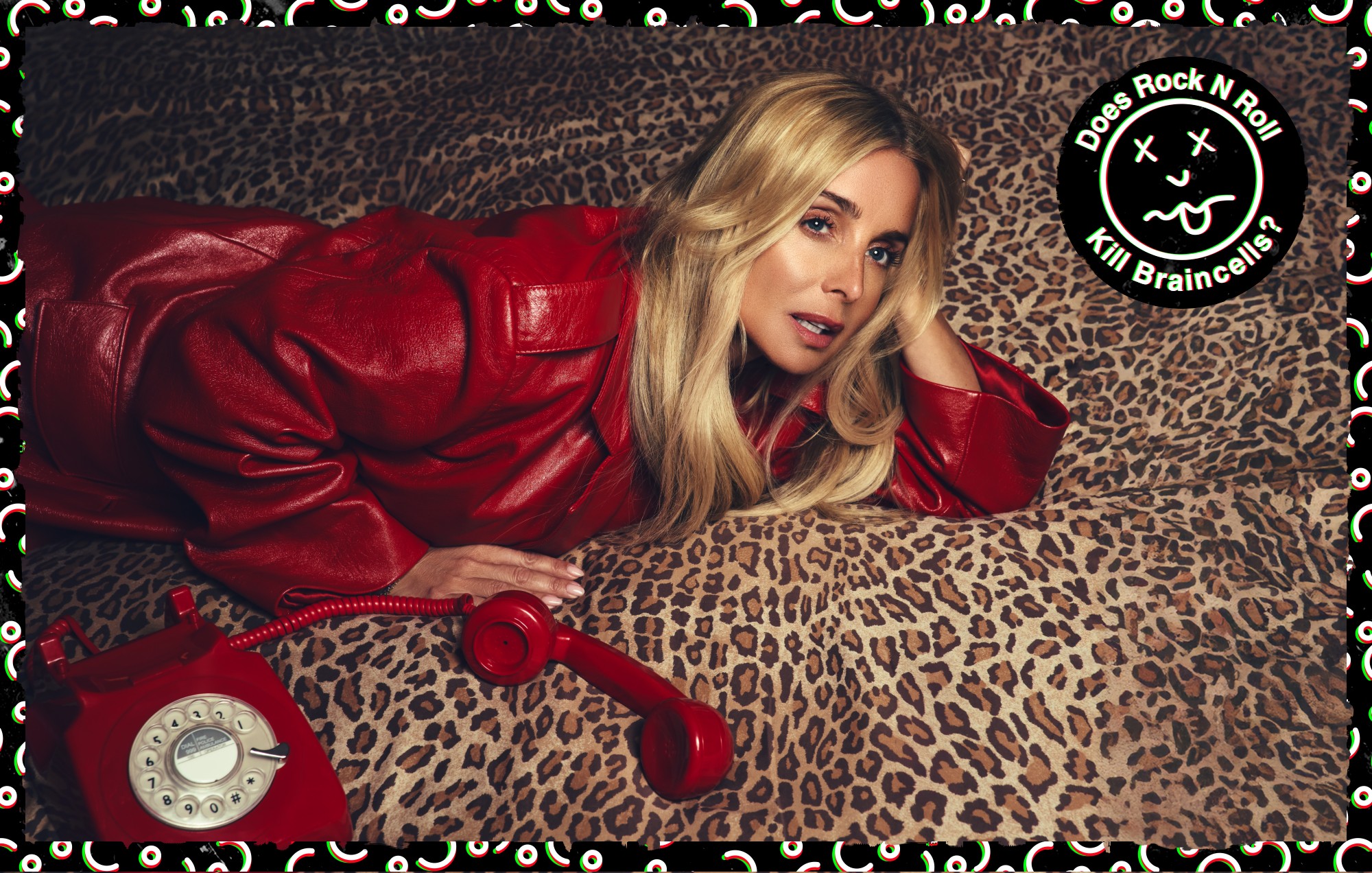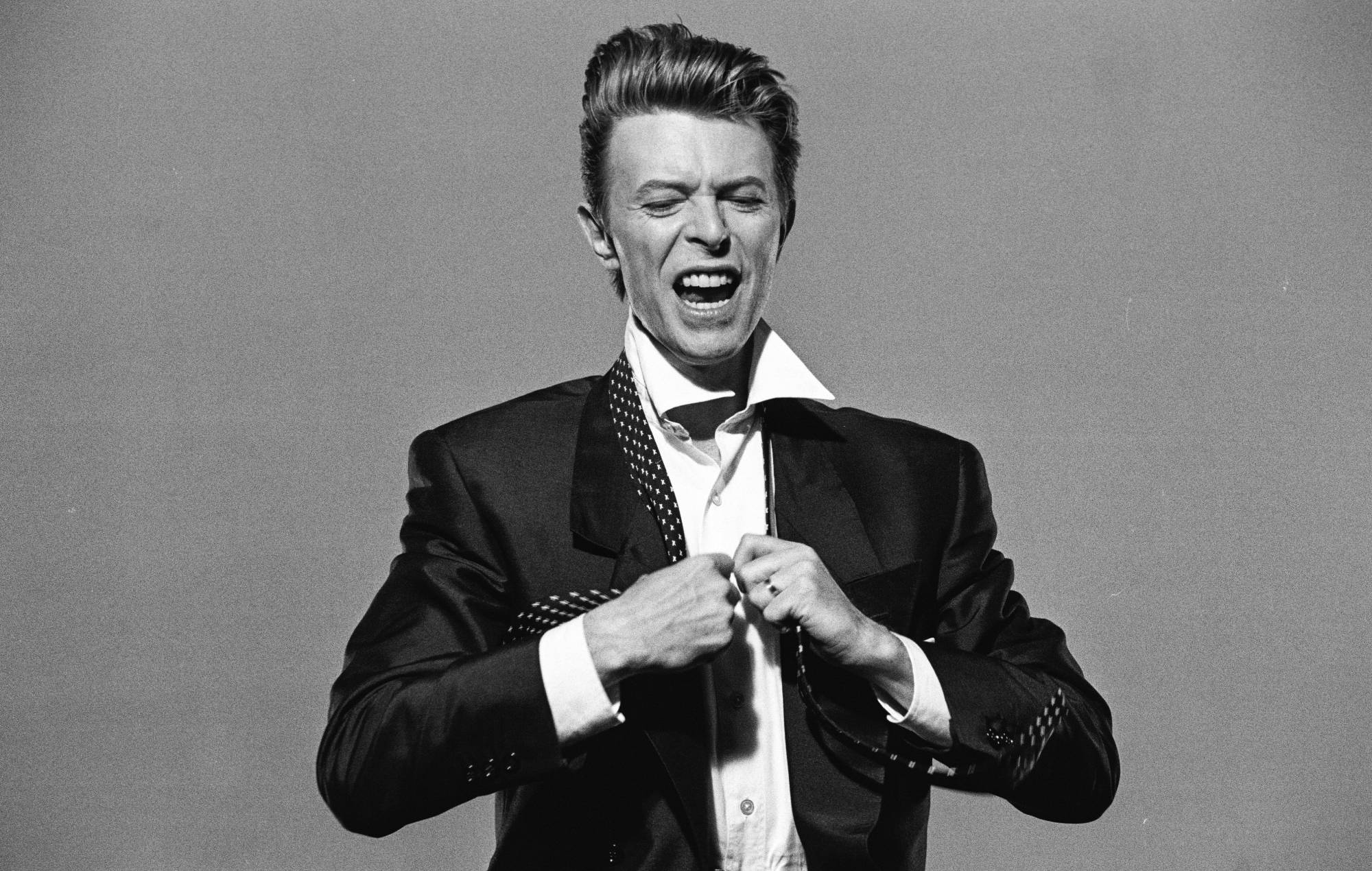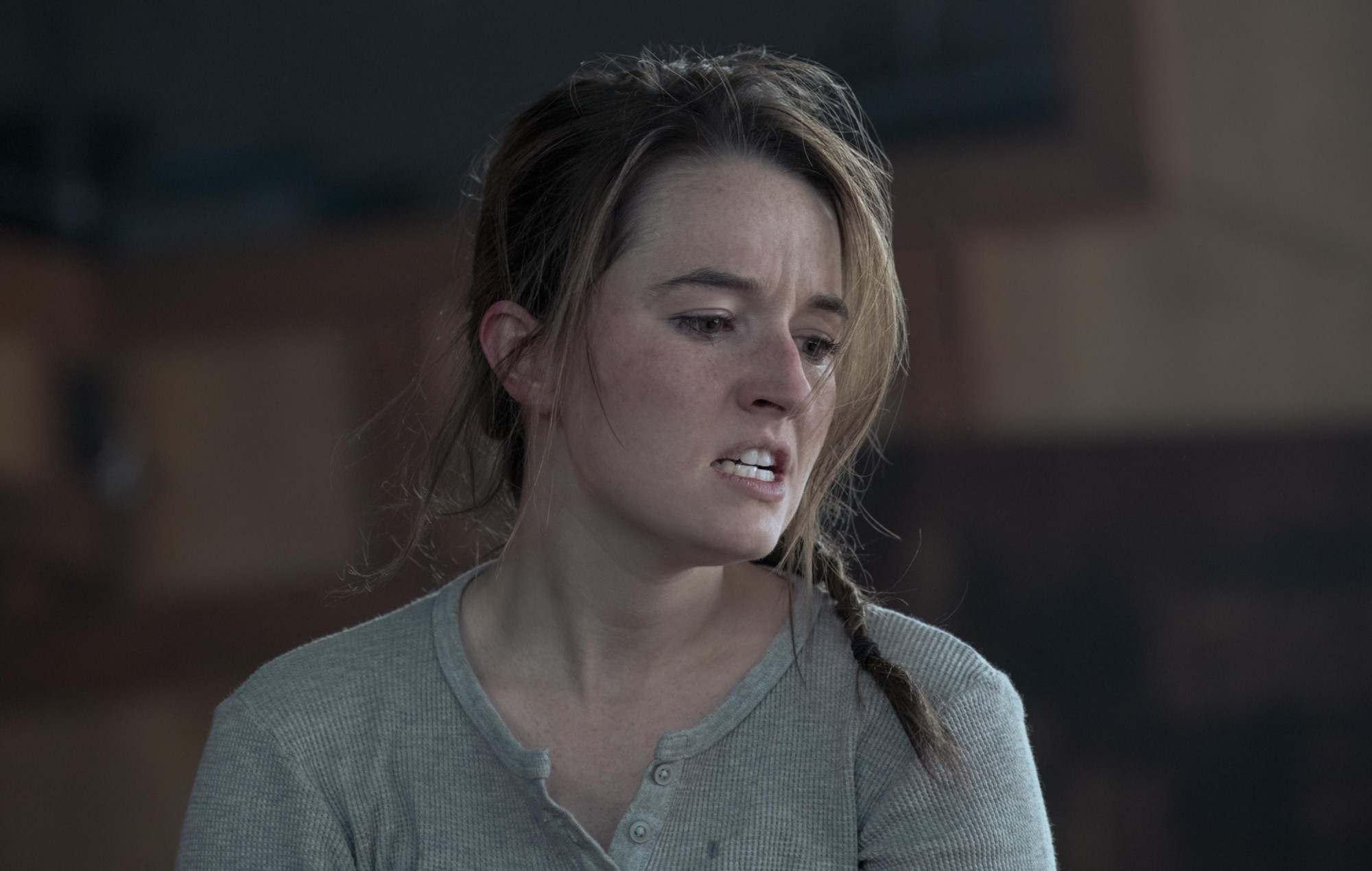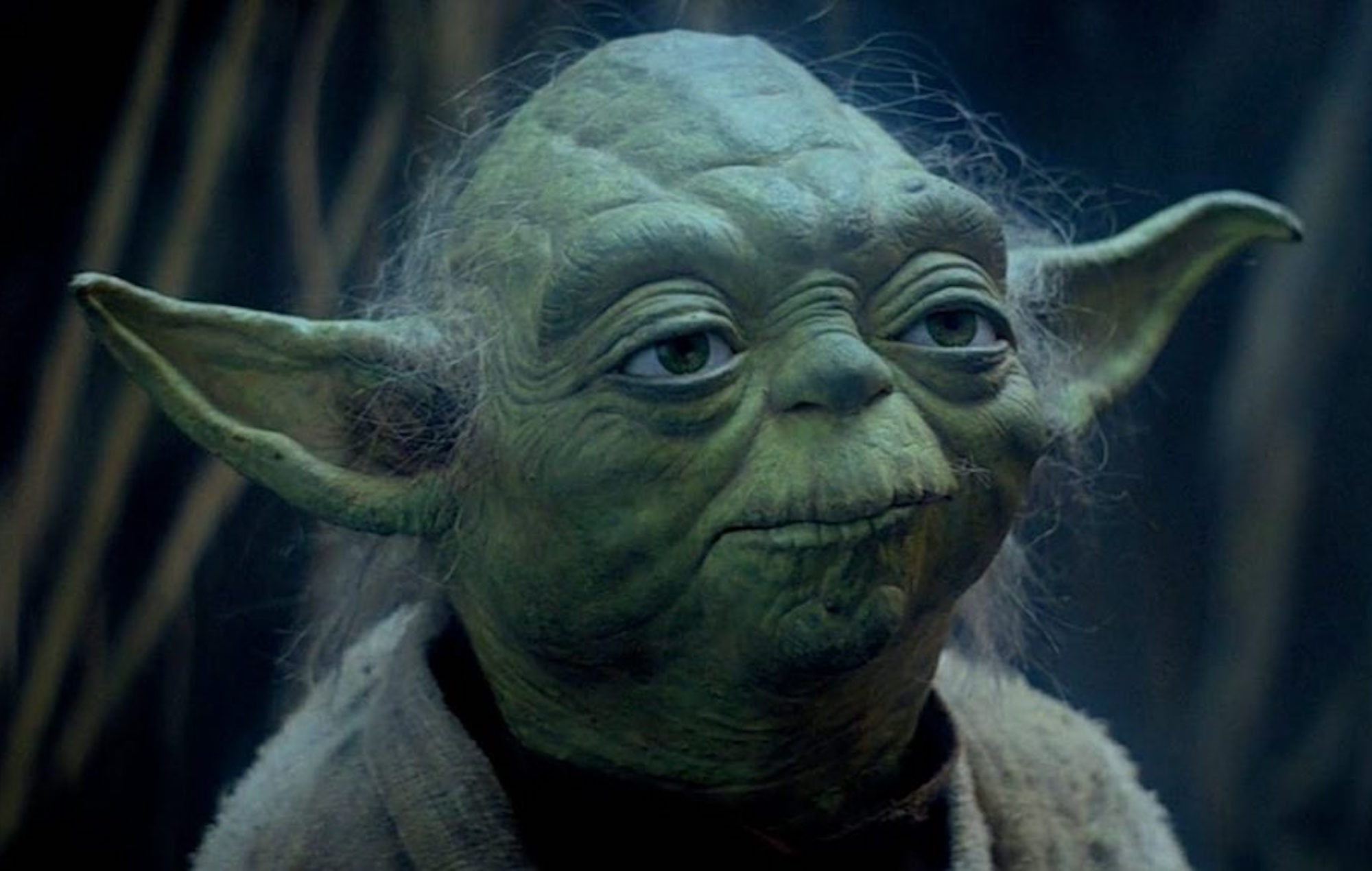Table of Contents
Amazing Album Artwork Image Is C/O Grow Wings and Fly King Gizzard & The Lizard Wizard!
So here’s the thing about King Gizzard & The Lizard Wizard: even when they’re breezy, they’re not really light. And “Grow Wings and Fly,” their latest single off the upcoming orchestral record Phantom Island, proves that again. The song floats—especially with that fluttery synth groove and the mellow vocal layers—but lyrically, there’s something a lot deeper going on.
For a band that’s played doom metal, microtonal psych, and full-on jazz fusion, this track feels stripped back. But don’t mistake that for simple. There’s emotional weight here—grief, growth, surrender—all tucked inside a chorus that sounds like it’s smiling through tears.
[embed]https://youtube.com/watch?v=152Of0LMRJA&si=Gz1oEcId2GzSXLaU[/embed]The track dropped alongside a surreal, beachy music video directed by Hayden Somerville, where Ambrose Kenny-Smith basically gets absorbed by the ocean. Somerville described it as “strange and beautiful,” and honestly, that’s not a bad way to describe the song either. There’s something in the way this one opens up space—musically and emotionally—that got my attention right away.
So I’m using this as an excuse to stretch my legs a bit, bringing in my background in English lit and creative writing to break down the lyrics more poetically. These are just my own thoughts, but I think looking at the song through a literary lens—alongside a few references to writers who’ve wrestled with these same emotional questions—can help surface some of the deeper threads Gizzard’s pulling at here.
“Grow Wings and Fly” at a glance:
- The beehive, the fire, the swan song—it’s not just surreal nonsense. This is a song about willingly walking into transformation, even when it burns.
- That duckling line? Yeah, it flips the power dynamic. You think you’re the one doing the teaching, but it turns out you’re the one learning how to let go.
- The last verse gets foggy and weird—and that’s the point. Doubt, time, and ego all get scrambled, and then we end up dancing in the rain like none of it mattered.
Lyrics
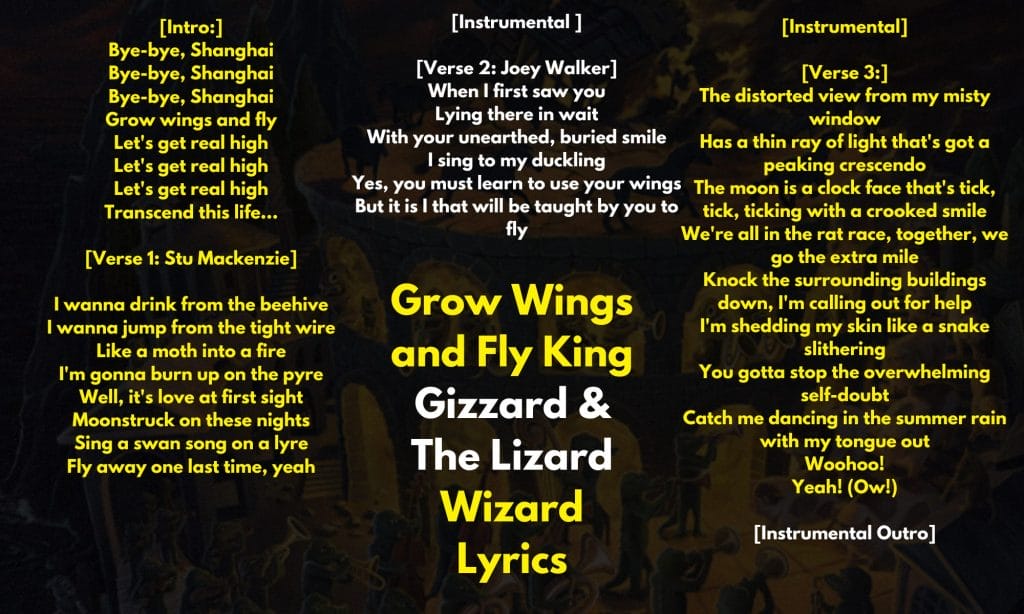
Grow Wings and Fly Meaning
“Bye-bye, Shanghai / Grow wings and fly”
Leaving behind a life that no longer fits
This first line sounds simple at first, but in my opinion, it’s doing a lot of heavy lifting. Saying “Bye-bye, Shanghai” It’s about saying goodbye to a phase of life, or even an old version of yourself. I hear it as the speaker making a choice: I’m ready to move on. That choice becomes clearer with the line that follows: “Grow wings and fly.” It’s both a farewell and a fresh start.
When they say, “Let’s get real high / Transcend this life,” I don’t believe they’re talking about drugs or escape. Instead, I think they mean they want to go beyond what’s holding them down. The word “transcend” means rising above something. So to me, this is about leaving behind fear, doubt, or old habits. It’s not just about going somewhere new—it’s about becoming someone new.
This idea shows up in Anne Carson’s The Glass Essay. She writes,
“Why hold onto all that?”
That line reminds me of the speaker here. Sometimes we carry too much from the past. Saying “bye-bye” is a way of letting go. Carson’s speaker, like King Gizzard’s, wants to grow—and knows that growth starts with release.
“I wanna drink from the beehive / Like a moth into a fire”
Risking pain to feel something real
This part of the song gets intense quickly. The line “I wanna drink from the beehive” is important. A beehive gives honey, but it’s also full of bees that can sting. That’s what I hear in these words: the sweetness is real, but so is the danger. The speaker wants both. They aren’t afraid to get hurt if it means feeling something powerful.
Then we get this:
“Like a moth into a fire / I’m gonna burn up on the pyre.”
To me, that sounds like someone running straight into a moment that could destroy them. But they’re doing it on purpose. The moth knows the fire is hot. Still, it can’t stay away. The speaker feels the same. They’re choosing change, even if it means they get burned in the process.
Poet René Char said it well in Leaves of Hypnos:
“Lucidity is the wound closest to the sun.”
Char believed that truth can hurt, but it also wakes you up. That’s what I see in this verse too. The speaker isn’t trying to stay safe. They’re willing to break apart if that’s what it takes to finally feel free.
“Sing a swan song on a lyre / Fly away one last time”
Goodbye to the old self
This is where I think the speaker begins to accept the end of something big. A “swan song” is someone’s final performance. And the “lyre” is an old, soft-sounding instrument. So together, the image feels peaceful—but final. I believe they’re saying goodbye to a version of themselves they’ve outgrown.
The next line—“Fly away one last time”—feels like the final step in that goodbye. It’s not a running-away moment. It’s more like accepting that the time has come. The word “last” adds weight to it. In my opinion, they’re not planning to come back. This is the end of one chapter, and the start of a new one.
Rainer Maria Rilke writes something similar in The Second Elegy:
“Is it not time for loving / and leaving, both, to be praised?
I think that’s what this verse is doing. It’s not bitter. It’s calm. It says: Yes, I loved what was. But now I’m ready to go.
“But it is I that will be taught by you to fly”
Love turns the teacher into the student
This line flips everything around. At first, the speaker says:
“Yes, you must learn to use your wings.”
That sounds like a parent teaching a child, or someone helping a friend grow. But then comes the twist:
“But it is I that will be taught by you to fly.”
Now, the speaker admits they’re the one learning.
This part is powerful to me. It shows how real love humbles us. You think you’re guiding someone—but then you realize they’re guiding you. That role reversal reminds me of how growth works. Often, we don’t grow by being in control. We grow by being open.
Rilke also talks about this in The Second Elegy. He writes:
“Who has turned us around like this?”
He means: Why do we always end up learning from the places we least expect? The speaker in “Shanghai” is realizing that too. What they thought was their lesson to give is really their lesson to learn.
“The moon is a clock face that’s tick, tick, ticking”
Time feels strange when everything is changing
This line brings in a strange, dreamlike image. The moon usually feels peaceful. But here, it’s a clock face, and it’s “ticking.” That ticking sound adds pressure. It makes the moon seem like a timer running out. And the smile? It’s “crooked,” not warm. I believe the speaker is feeling disoriented, like time isn’t moving in the way it used to.
Earlier, they also say:
“The distorted view from my misty window.”
That tells us everything is foggy. They can’t see clearly. But they also say there’s “a thin ray of light.” That small bit of light means there’s still hope. Even in confusion, there’s something guiding them forward.
René Char describes something similar:
“In the middle of the night, I shouted who I was to no one.”
That’s what this moment feels like—yelling out into the unknown, not sure if anyone is listening. It’s not a clear moment. But it’s still honest.
“I’m shedding my skin like a snake slithering”
Transformation is uncomfortable—but necessary
Snakes shed their skin when they grow. It’s not something they choose. It’s something they have to do. That’s what I hear in this line. The speaker is going through a big change. It’s messy. It might feel weird. But it’s part of moving forward.
The next line—“You gotta stop the overwhelming self-doubt”—is direct. I think the speaker is talking to themselves. This is a moment of clarity. They’re saying: If I want to grow, I have to stop doubting who I am.
This fits with Anne Carson’s idea of memory and emotion holding us back. She writes:
“My face in the mirror has never looked just right.”
That’s doubt. That’s the feeling of not fully knowing who you are. But the speaker in “Shanghai” is pushing past that. They’re choosing to change, even if it’s scary.
“Catch me dancing in the summer rain with my tongue out”
Surrendering to the present moment
This is the last image the song gives us—and it’s one of freedom. The speaker is outside, in the rain, mouth open, dancing. There’s no shame here. No fear. Just being. This line, to me, is a celebration. After all the confusion, pain, and letting go, they’re finally alive in the moment.
I think this moment shows us that transformation isn’t clean. It’s not always clear or pretty. But if you can surrender to it—just be in it—you’ll find something beautiful.
Rilke says it like this:
“Let everything happen to you: beauty and terror. / Just keep going. No feeling is final.”
That’s exactly what’s happening here. The speaker has felt everything—and now they’re just letting life in.
Connecting All The Dots
What stuck with me after a few spins of “Grow Wings and Fly” is how quiet the song feels on the surface, but how heavy it actually is underneath. There’s no plot to follow—just a slow-motion emotional unraveling that happens in three voices, each one peeling off a different layer.
That kind of layered structure matches what the band’s doing across Phantom Island as a whole. According to Stu Mackenzie, the tracks on this album were “harder to finish” and needed more time, more space, more thought—and you can hear that here. The lyrics don’t rush to make their point.
They sit in the weird, foggy middle of things: love, doubt, release, confusion. It’s a song about the kind of change that creeps up on you, not the kind you plan for.
That whole middle section—“I sing to my duckling… but it is I that will be taught by you to fly”—is where the song turns inside out. You go in thinking the speaker’s in control, and then that flips completely. It reminds me of that moment in The Glass Essay where Anne Carson’s speaker realizes she’s not analyzing grief—she’s still deep in it. There’s a similar reversal here, like: I thought I was the one leading, but actually I’ve got more to learn than I thought. Same with Rilke’s line, “Who has turned us around like this…,” which has the same kind of unsettled awe that shows up in the song’s final verse.
Time bends, the moon smirks, buildings collapse—it’s not about finding answers. It’s about recognizing that something’s shifting and letting yourself move with it, even if it doesn’t make sense yet.
And then there’s that final line—dancing in the summer rain with your tongue out. That’s not closure, not even close. But it is a moment of total surrender. You can draw a line from that straight back to René Char, who wrote, “In the middle of the night, I shouted who I was to no one.”
Both moments are messy, unfiltered, a little desperate—but weirdly joyful. And that’s what makes the song work. “Grow Wings and Fly” shows us what it feels like to fall apart a little and find something new in the space that opens up. Not by force, not by logic—just by letting go.
The post Grow Wings and Fly King Gizzard & The Lizard Wizard Lyrics And Meaning: Letting Go, Burning Bright, and Learning Through Love appeared first on Magnetic Magazine.
